Key takeaways:
- Local business networking is about building genuine relationships and showing interest in others’ journeys, which fosters a strong community.
- Effective leadership in networking encourages participation, builds trust, and connects individuals for collaborative success.
- Strategies like asking open-ended questions, meaningful follow-ups, and embracing vulnerability can significantly enhance networking effectiveness.
- Building relationships with local leaders involves active listening, engaging in community forums, and overcoming fear of rejection to create valuable connections.
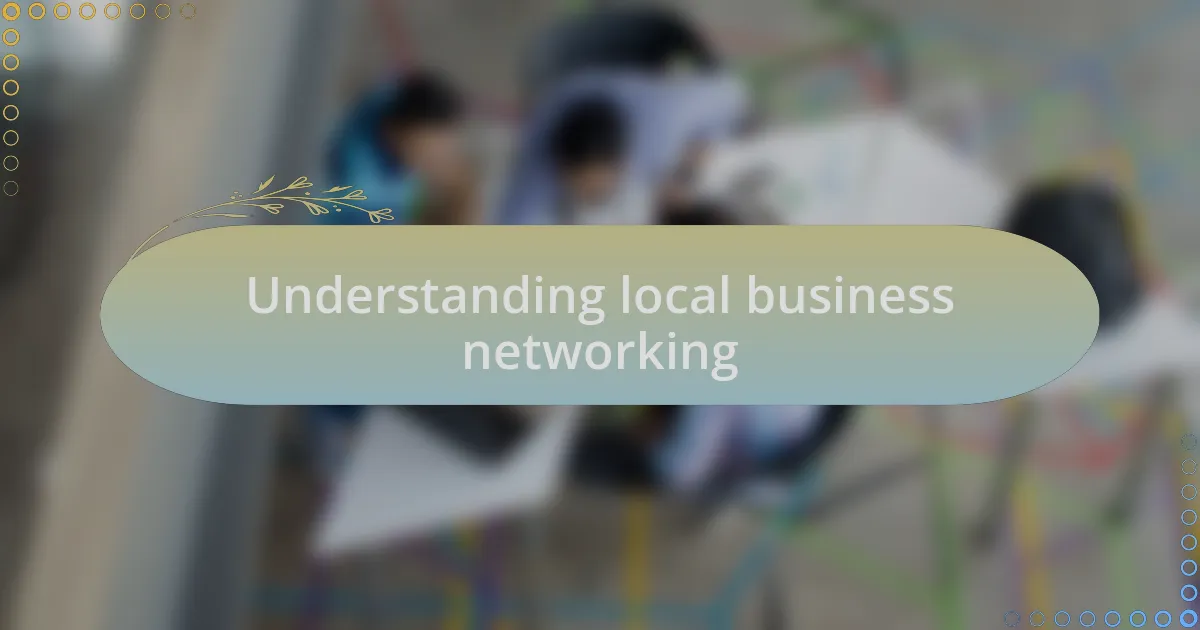
Understanding local business networking
Local business networking is about creating meaningful connections that can lead to collaborative opportunities. I remember attending my first local networking event, feeling a mix of excitement and anxiety. The moment I introduced myself, I realized the power of shared experiences and how they can forge lasting relationships.
It’s fascinating how networking can sometimes feel like a dance—you meet new people, exchange ideas, and discover mutual interests. There were times when I left a meeting buzzing with inspiration, having learned from others’ successes and challenges. Have you ever felt that surge of motivation after a great conversation? It’s that kind of energy that fuels local businesses and builds a community.
Understanding the nuances of local business networking goes beyond just shaking hands and trading business cards. It’s about nurturing those relationships and being genuinely interested in others’ journeys. I often find myself following up with connections, not just for business but to celebrate their achievements or lend a listening ear. Isn’t it rewarding to know that your support has a positive impact on someone else’s path?
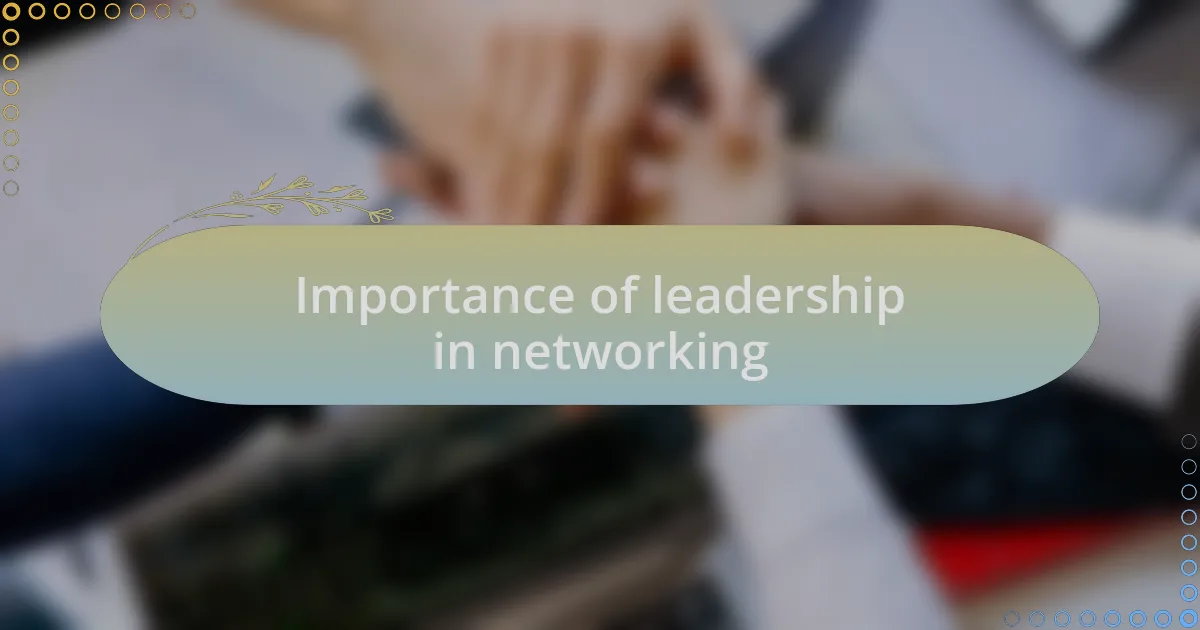
Importance of leadership in networking
Leadership plays a crucial role in local networking, acting as a guiding force that can elevate collective success. I’ve seen firsthand how effective leaders can light the way for others, encouraging participation and fostering an environment of trust. Think about it—when a leader openly shares their knowledge and experiences, it creates a safe space for others to do the same, right?
In my experience, leaders in networking groups often serve as connectors, linking individuals based on their strengths and needs. I recall a specific occasion where a seasoned entrepreneur introduced me to a graphic designer I desperately needed. That simple act of leadership led to a fruitful collaboration, highlighting how leadership can turn casual acquaintances into valuable partnerships.
Moreover, leadership nurtures resilience within a network. When challenges arise, a strong leader can motivate the group to adapt and overcome obstacles together. Have you ever found inspiration in a leader’s words during difficult times? Those moments stick with you, reminding everyone involved that perseverance often follows unity, and that’s where networking shines.
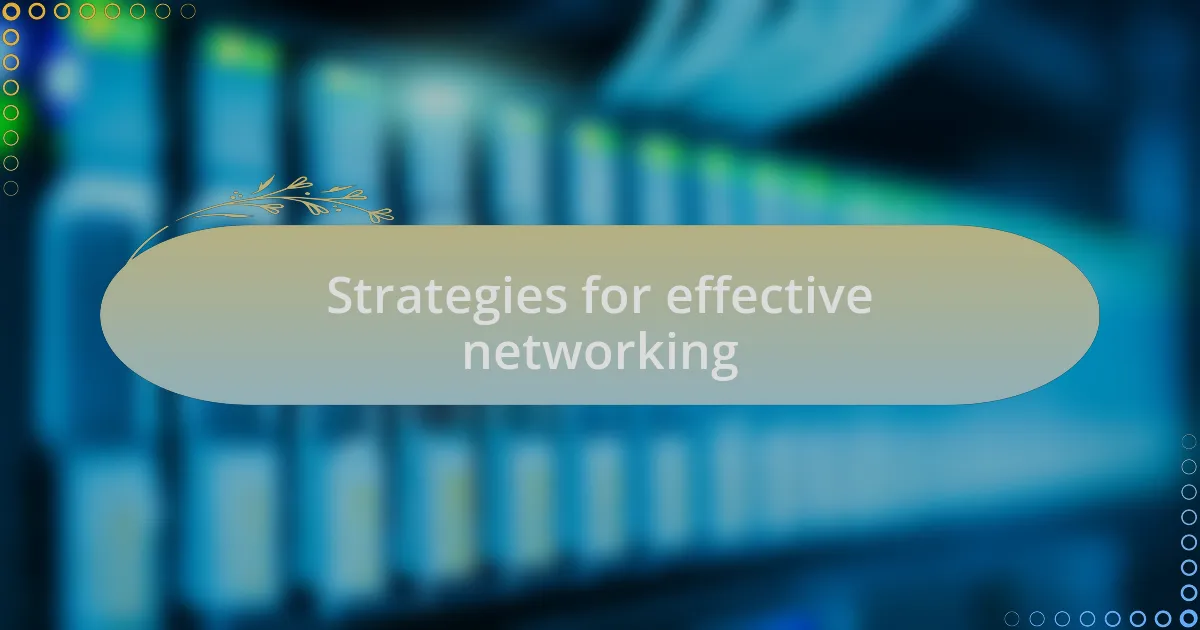
Strategies for effective networking
Building relationships is at the heart of effective networking. One strategy I’ve adopted is to approach each networking event with a genuine curiosity about others. I remember attending a local business meetup where I made it a point to ask open-ended questions, allowing others to share their stories. This not only eased my nerves but also created connections based on mutual interests and experiences. When you show that you care about what others have to say, they are more likely to reciprocate.
Another essential strategy is to follow up meaningfully after initial meetings. There was a time when I met a promising local entrepreneur, and instead of just collecting their business card, I sent a personalized email referencing our conversation. This simple act transformed a fleeting encounter into an ongoing dialogue. Have you ever considered the power of a well-crafted follow-up? It serves as a reminder that you value the relationship, setting the stage for further collaboration.
Lastly, embracing vulnerability can be surprisingly effective. I once opened up about my struggles in managing a team during a networking session, which unexpectedly resonated with many attendees. Sharing challenges fosters a sense of community, encouraging others to open up as well. Isn’t it fascinating how by being real, we can cultivate deeper connections? These moments of authenticity not only enhance trust but also spark engaging conversations that can lead to lasting partnerships.
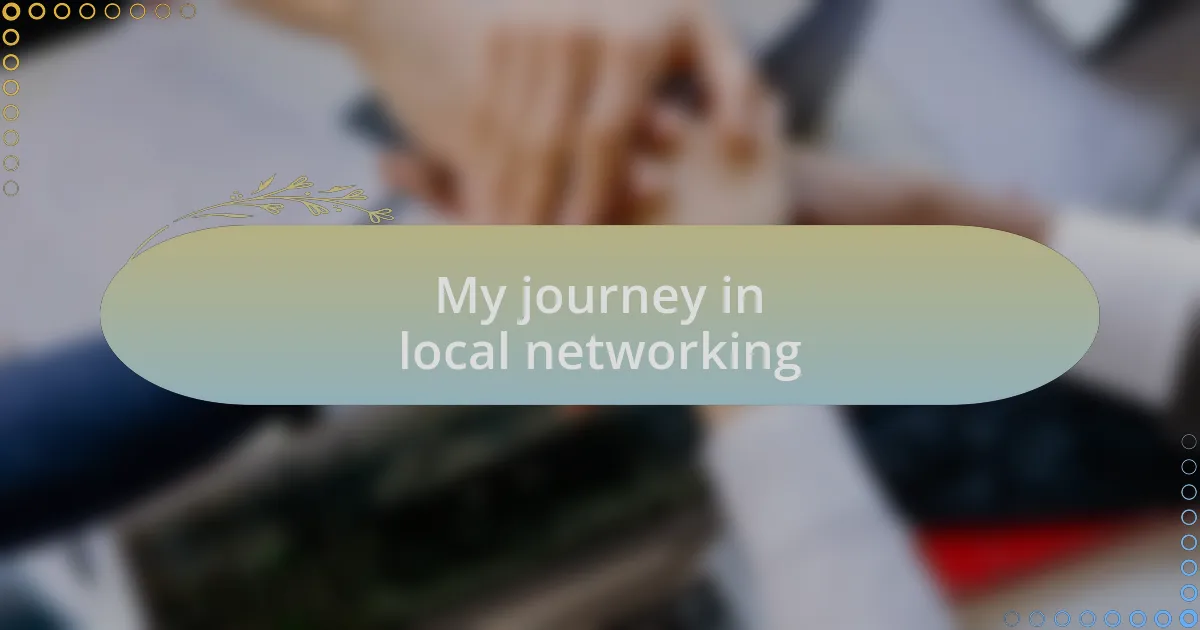
My journey in local networking
Stepping into local networking felt like entering a new world for me. I vividly recall my first event; I was nervous and unsure of what to say. However, I discovered that simply being myself and sharing my passion for local business made a dramatic difference. It was a revelation to see how authenticity opens doors—have you ever noticed how people naturally gravitate toward genuine energy?
Over time, I realized that local networking isn’t just about exchanging business cards; it’s about nurturing relationships. One memorable moment was when I helped a fellow entrepreneur refine their business pitch during a casual coffee chat. The gratitude in their eyes reminded me of the impact we can have on one another’s journeys. Isn’t it rewarding to see others succeed, knowing you played a small part in their story?
As I continued my journey, I learned the value of community involvement. Participating in local events, like fundraisers or fairs, not only expanded my network but also deepened my connection to the area. I vividly remember collaborating on a local charity event and feeling a sense of belonging. It was more than networking; it was about aligning my values with those of others. Have you found a way to blend your interests with your networking efforts? Each experience reinforced my belief that connections are most fulfilling when grounded in shared passions.
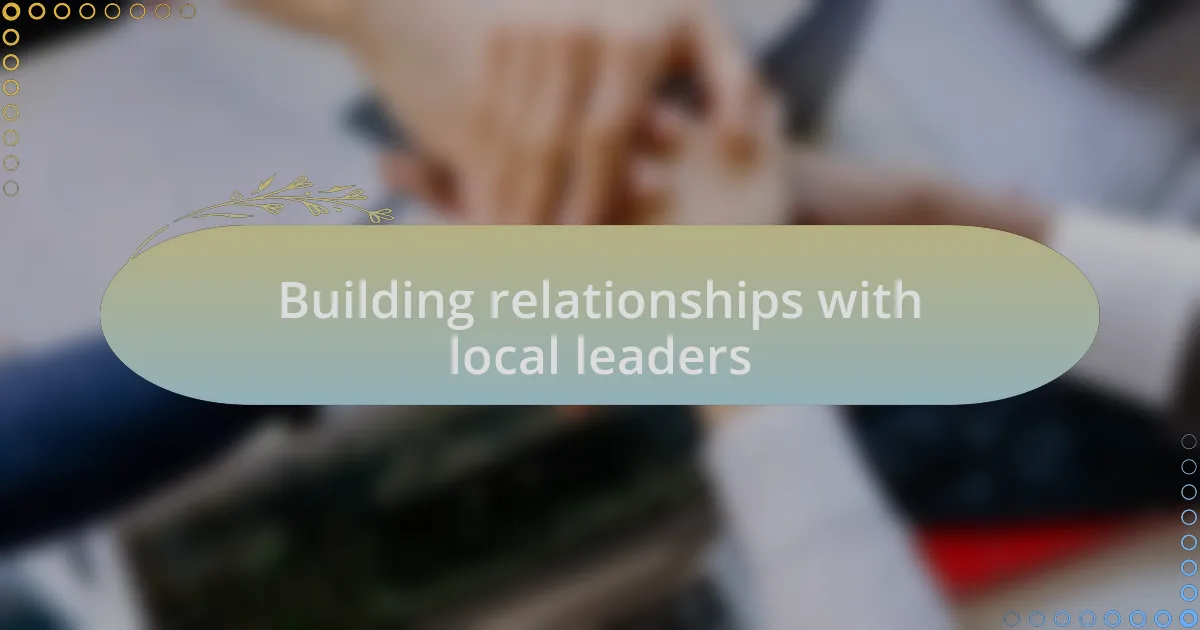
Building relationships with local leaders
Building relationships with local leaders has been a transformative aspect of my networking experience. I remember the first time I approached a local business owner who had a stellar reputation in our community. I was intimidated, but I asked for advice on overcoming challenges in our industry. To my surprise, they not only welcomed my questions graciously but also offered to connect me with others in their network. Have you had a moment where you felt an unexpected warmth from someone you admired?
Listening and genuinely engaging have been key in forging these connections. At one local leadership roundtable, I shared my insights about marketing strategies specific to small businesses. Afterward, several leaders came up to me with thoughtful questions and shared their own experiences. That collaborative spirit reinforced my understanding that building relationships involves mutual growth. Isn’t it incredible how a simple dialogue can lead to new opportunities?
I’ve also found that attending community forums can significantly strengthen bonds with local leaders. One evening, I participated in a town hall discussion that addressed issues affecting our business landscape. Engaging with local leaders during that forum, I was struck by how our shared concerns turned into actionable strategies. It made me realize that when we align our goals, we become not just acquaintances but partners in progress. Have you discovered local events that inspired you to step outside your comfort zone?
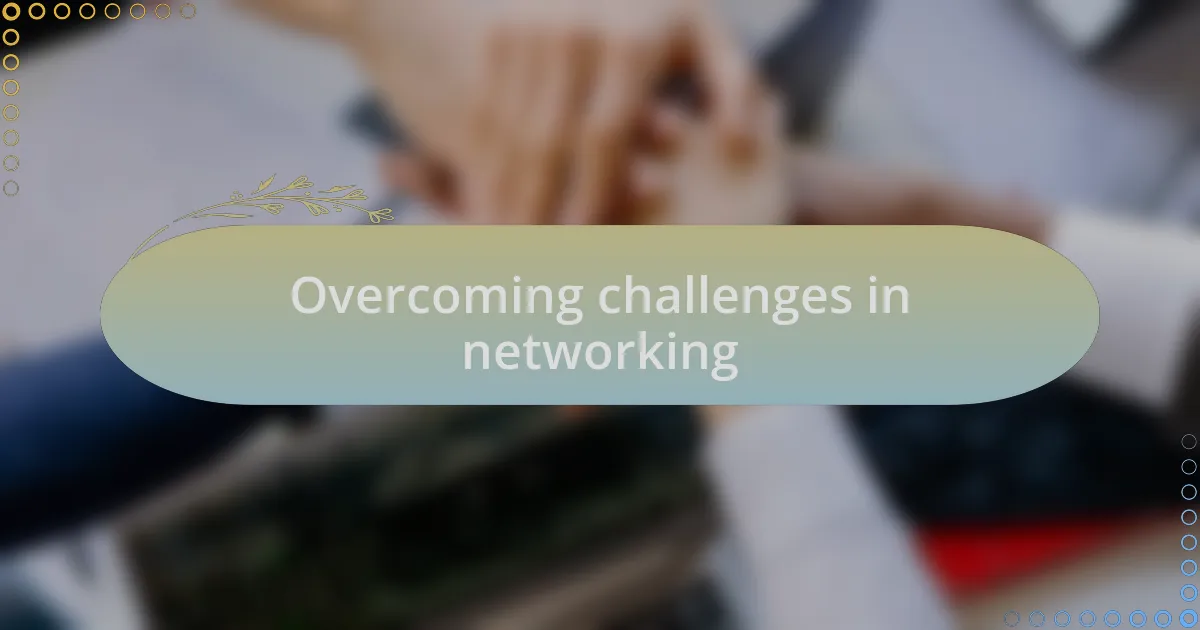
Overcoming challenges in networking
Overcoming challenges in networking often requires us to step beyond our comfort zones. There was a time when I hesitated to introduce myself at networking events, overwhelmed by the myriad of conversations swirling around me. But I realized that everyone was there with the same goal—to connect. So, I took a deep breath and approached someone who looked just as unsure as I felt. That simple act of reaching out not only eased my anxiety but also led to a fruitful conversation that sparked a lasting relationship.
Another challenge I faced was dealing with the fear of rejection. Initially, I avoided asking established leaders for advice, worried they wouldn’t find my inquiries valuable. However, I learned that vulnerability often paves the way for authentic connections. Once, I mustered the courage to reach out to a prominent entrepreneur in our area. To my astonishment, they responded positively and even invited me to coffee. That experience taught me that embracing vulnerability can open doors I never thought possible.
I’ve also encountered the challenge of finding common ground with diverse individuals in the networking scene. During a collaborative event, I struggled to resonate with people from different industries. It was frustrating until I realized that our challenges often echoed one another, regardless of the field. Sharing my perspective helped bridge that gap, revealing that at the core, we all face similar hurdles. Isn’t it fascinating how common ground can unite us, despite our differing backgrounds?
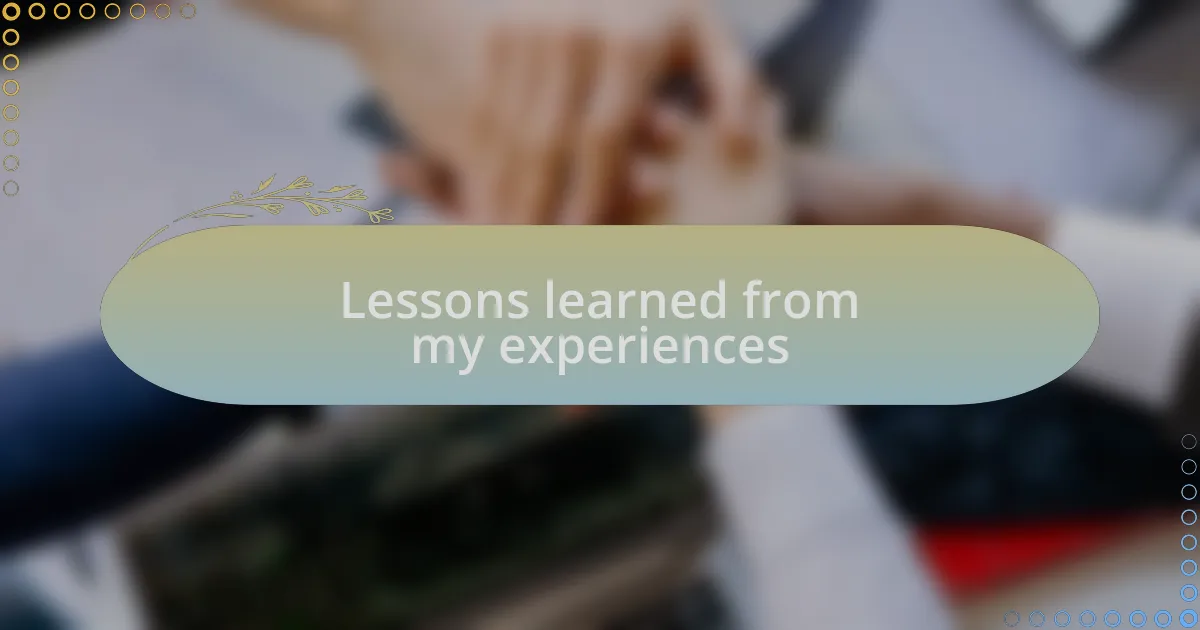
Lessons learned from my experiences
In my journey through various leadership roles, one significant lesson I learned is the power of active listening. I once attended a business meeting where the discussions meandered without focus. Instead of dominating the conversation, I made an effort to genuinely listen to others. This shift not only fostered a more collaborative atmosphere but also allowed me to grasp innovative ideas that I might have overlooked. Isn’t it interesting how sometimes the best insights come from the quietest voices in the room?
Another enlightening experience for me was recognizing the importance of adaptability. I vividly recall a networking event where a last-minute change shifted the agenda entirely. Initially, I panicked, thinking this disruption would derail my plans. However, I quickly realized it was an opportunity to showcase my flexibility and even introduced new topics that sparked dynamic discussions. Have you ever found that some of the best moments come from unexpected changes?
Furthermore, I’ve come to understand that building trust takes time and consistency. When I first joined a local business group, I focused on making as many connections as possible within a short period. It wasn’t until I nurtured a few key relationships over time, showing up consistently and providing support, that these connections transformed into something meaningful. This experience underscored the value of patience in networking—doesn’t it often feel like quality trumps quantity?